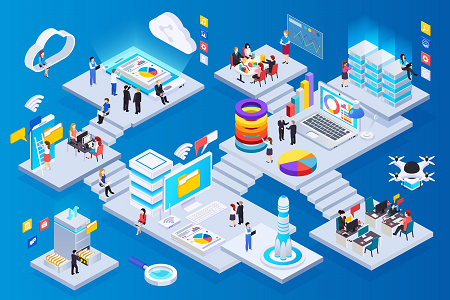Salient IT Services › Data center backup in Folsom
What you need to know about data center backup in Folsom
Backing up data in a public cloud can be a bit of a technical challenge. Backing up an entire data center can be even more of an undertaking. The bad news is that it must be done. The good news is that even SMBs can manage the challenges of data center backups as long as they use the right approach and the right tools. With that in mind, here is a quick guide to what you need to know about data center backup in Folsom.
Data center backup includes a lot more than “just” data
One of the many reasons SMBs have flocked to the public cloud is because it means that managing hardware is someone else’s problem. If you’re running your own data center, however, it’s your problem. Similarly, it’s your problem to manage core digital assets such as operating systems and applications and all the configuration data required to make them work as users expect. If you’re using virtual environments, it’s also on you to keep track of the data for the host and management console.
Last but definitely not least, it’s strongly advisable to make sure that you have a straightforward means of contacting any key people involved in the running of your data center, including your supplier. This is likely to mean also having an easily-accessible backup of any information necessary to demonstrate your legal use of a digital asset, such as your licensing information.
Managing your data is key to managing your data center backup
Having just said that there is a lot more to data center backups than just backing up data, the fact remains that data centers, literally, exist to store and process business data. This means that they tend to have a lot of it and it needs to be managed carefully for a whole number of reasons, starting with legal ones.
First of all, it’s strongly recommended to minimize the amount of personal data you collect and to ensure that it is only kept for as long as it is needed. This is increasingly likely to be a legal requirement and even if it’s not, it’s very definitely best practice. You should also aim to move personal data out of your production systems as quickly as possible either by deleting it or archiving it. This may not result in a great performance increase for your data backup process (or your restoration process) but it will do a lot to reduce your security risk.

Your second priority is to keep tabs on any other data with legal implications such as compliance data, legal data (e.g. data proving your ownership of assets such as intellectual property) and confidential data. These should usually be treated in much the same way as personal data.
Last but definitely not least, you need to identify what data is core to the running of your business. Depending on your size and level of expertise, you may even want to segment it further to enable more in-depth management. This can be a lot easier in a public cloud than in a data center, however, it is certainly possible if you have the resources and can be very beneficial.
Hopefully, by this point, you have covered all the data in your production systems and if you haven’t then it could be a sign that you need to check why data is in your production systems. If it’s not core to your business, then does it really need to be in a place where it’s going to be backed up (and potentially recovered) unnecessarily? If nobody can agree to delete it could it at least be archived instead?
It’s vital to choose the right data center backup tools for your needs
You need one or more solutions to manage the data center backup process and you need one or more forms of storage to hold the data you are backing up. There are all-in-one hardware solutions that can do both. These can be great plug-and-play solutions, but they tend to have limited options for customization and hence tend to be best suited to smaller data centers.
Cloud-based solutions (Backup-as-a-Service) are lightweight, affordable and generally easy to use. They do depend on a reliable internet connection but this is unlikely to be an issue these days.
Software solutions and hybrid solutions (part-software/part-BaaS) tend to be the best choices for SMBs which need more control over their backup process, including, for example, the flexibility to use SSDs and tapes together to harness the power of the former and the robust cost-effectiveness of the latter.
If you’d like to speak to a reputable and experienced data center backup partner in Folsom, please click here now to contact Salient IT.



